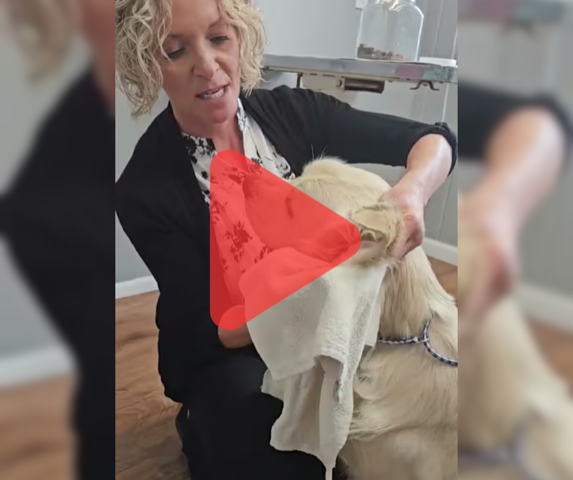Imagine a hot summer afternoon, you and your dog decide to cool off by jumping into the lake. While this sounds picturesque and refreshing, even if you both know how to swim, there are dangers to be aware of when swimming in our central Illinois natural bodies of water. Pollutants and algae growth can cause illness for us and our pets when swimming in a lake or river. There is always a chance of bacterial, fungal or viral exposure.
If you’ve ever had an ear infection you know how painful they can be. While ear infections in dogs do not occur exclusively after swimming, introducing contaminated water into a dark, warm ear canal often can cause an ear infection. Signs of an ear infection include head shaking, ear drooping, stinky ear discharge, scratching ears, whining or crying when touching ears. Please see the video below where Dr. Janelle explains how to clean Sam’s ears.
Whether they are from contaminated run off or the natural environment, there are microscopic creatures living in fresh water. One parasite that can be found in fresh water is Giardia. Giardia can live for months in a cool, wet environment. Young pets are most likely to be symptomatic for Giardia but older pets can harbor the parasite while being asymptomatic. Symptoms including, diarrhea, often foul smelling, vomiting and abdominal discomfort. Transmission occurs when feces-infected water is ingested. Humans can also become infected with Giardia.
Blue-green algae or cyanobacteria may also be present in fresh water in central Illinois. Cyanobacteria growth commonly occurs in the summer months and into the early fall months. Water must be tested to confirm the presence of this bacteria. It is most likely to be present in stagnant or slow water, it appears as blue-green, or red-brown vegetation in a pond. Due to the toxicity of the cyanobacteria avoiding exposure to the bacteria is our recommendation. Swimming in or drinking the contaminated water can be fatal. If you believe your pet came into contact with cyanobacteria immediately rinse their coat and call ASPCA Animal Poison Control Center: 888-426-4435 Please keep in mind, cyanobacteria is also dangerous to humans.
The beautiful landscape and sporting opportunities in the great outdoors of west central Illinois are one of the blessings of living in this area. At Wags and Whiskers Veterinary Service we always encourage an active lifestyle and maximizing time spent outdoors for humans and animals alike. Don’t let this article detour you from enjoying spending time in nature but instead equip yourself with the knowledge to prevent potentially hazardous situations. Make sure you pay attention to your surroundings as well as any alerts posted by your local health department or state EPA or DNR. Get outside and enjoy this beautiful summer day!

